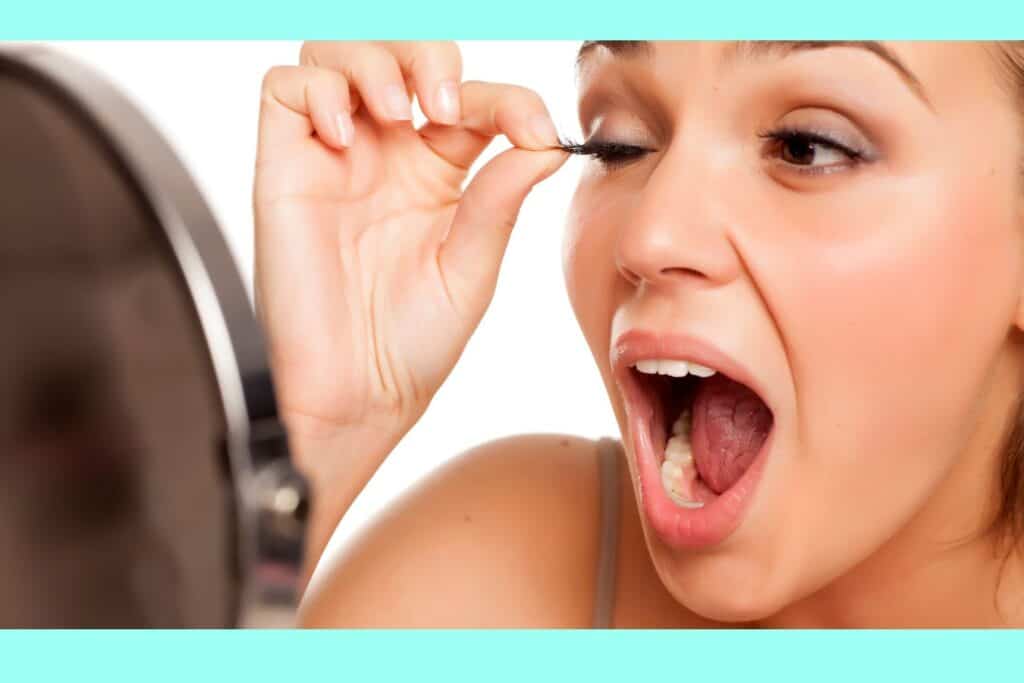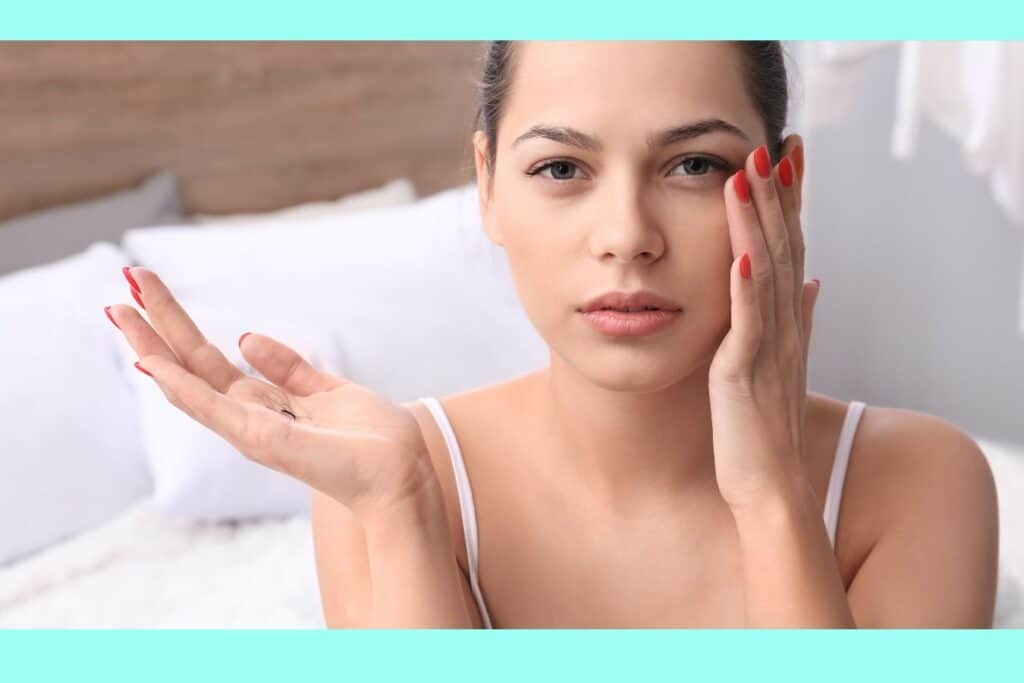As we age, our hair turns gray and some of us may even lose our hair. This is also the case with eyelashes. But why do eyelashes fall out with age and is there something we can do to prevent this? We did some thorough investigation and have the answers you need.

Main Takeaways
- Lashes can fall out with age due to hormonal changes
- Women who experience menopause may be affected by hair loss as testosterone becomes the dominant hormone
- Conditions such as hyperthyroidism, hypothyroidism, alopecia, and other autoimmune conditions can also cause hair loss
- To prevent eyelash loss, clean your face at night, remove make up and eat a protein-rich diet
Why Do Eyelashes Fall Out With Age?
As we grow older, our eyelashes fall out as a result of hormonal changes. Shifts in hormone levels will disrupt the normal functioning of hair follicles, which in turn results in eyelashes thinning or shedding.
So overall, it is very normal for eyelashes to fall out with age but there are also other factors at play.
When women experience menopause, the sex hormones in their body change.
Testosterone tends to become more dominant, and the hormone that stimulates the hair follicles reduces.
As a result, hair typically becomes thinner, both on the head and the eyelashes. In some cases, this might result in the loss of eyelashes.
Other Reasons why Eye Lashes Fall Out
Besides age, there is a number of other factors that may cause your lashes to fall out. These include:
Hereditary and medical conditions
There is a range of genetic and medical conditions that can result in eyelash loss – this list is not exhaustive, but describes the hereditary conditions most associated with hair loss.
- hyperthyroidism and hypothyroidism can cause hair loss (as well as a host of other issues).
- Alopecia and other autoimmune conditions may also inhibit hair growth, as do chronic inflammatory diseases like lupus and rheumatic arthritis, as they impede the healthy functioning of cells.
If you think that you may have any of the above conditions, it’s always best to seek medical assistance.
Remember, if you’re undergoing a course of chemotherapy, you will also likely experience eyelash loss.
Similarly, if you have eczema or psoriasis, or are experiencing chronic stress, then you may notice that your eyelashes fall out.
Bad beauty habits
If you are forgetting or choosing not to remove make-up before bed, then you’re more likely to experience thinning or shedding eyelashes.
You need to take care to always remove make-up before bed, but you should also use a gentle cleanser to remove the day’s residue from your lashes, even if you haven’t been wearing make-up.
Remember to always be as gentle as possible when removing your make-up and cleansing lashes.
Pulling or tugging at lashes will cause them to fall out. It’s also best to avoid rubbing your eyes for this reason, too.
A bad beauty routine can also result in your lashes growing straight instead of curly. This can be caused by damaged follicles so it is important to hydrate your lashes and remove all makeup at night.
Using heated eyelash curlers
They may be promoted by beauty influencers, but it’s best to avoid heated eyelash curlers.
The risk is that you overheat the tool, which will fry your eyelashes and cause them to fall out. You could also end up burning the delicate skin around your eyes and your eyelids.
Blepharitis
If you feel like you have swollen, itchy, and inflamed eyelids, then you may well have blepharitis.
This is a condition where your oil glands near the eyelashes become clogged, leading to inflammation and inhibiting proper functioning of your follicles.
As a result, your eyelashes may begin to fall out.
Thankfully, if you practice good eyelid hygiene and regularly cleanse your eyes, you should be able to shift blepharitis.
Don’t wear contact lenses or eye makeup whilst you have blepharitis.
Should regular use of a hot compress and cleansing of your eyes not work to shift your blepharitis, you can seek the assistance of a doctor to prescribe eyedrops or ointment.
Allergies
If you try a new beauty or make-up product and haven’t either patch-tested or checked that you aren’t allergic to the ingredients, then you may experience an allergic reaction.
If this is severe enough, then it may cause eyelashes to fall out.
How To Treat And Prevent Thinning Eyelashes

Luckily, there are a number of ways to preserve your long lashes if you’re willing to put in the work. These are:
Good beauty habits
Always remove your eye makeup before bed, and take care to be gentle when you do so.
Leaving your mascara on makes lashes brittle and dehydrates them, so they will be more likely to shed or thin.
You should also always cleanse your face and eyes even if you haven’t worn makeup.
As you go about your day, your face and eyelashes will pick up microscopic particles of environmental debris.
As such, you need to cleanse your face to remove this at the end of every day.
Use a lash growth serum
There are plenty of reputable lash growth serums on the market, and you can also use natural oils like castor oil or argan oil to nourish and condition lashes.
Always take care to do your research and patch test before use.
Latisse is one of the best-known lash growth serums. It’s FDA-approved and has to be prescribed by a doctor or dermatologist.
Sleep on silk
Sleeping on silk or satin pillowcases may help to reduce eyelash thinning.
You’ll have less friction between your lashes and the pillow if the case is made of silk or satin compared to a case made of cotton or linen.
You’ll also experience the other anti-aging benefits of silk pillowcases for your skin, and the anti-static effects on your hair.
Diet
Your diet is one of the best ways to intervene in the health of your eyelashes. Go for foods that are protein-rich in order to support the keratin of your lashes.
Nuts, broccoli, and whole grains are good for this. You should also keep up your iron intake via dark, leafy greens, seafood, and beans and pulses.
You should also aim to intake as many vitamins as possible, particularly those rich in vitamins A and C, which support cell and collagen production and therefore support eyelash growth.
Food containing niacin (vitamin B3) will improve blood flow to the hair follicles, thereby stimulating eyelash growth.
Opt for foods like citrus fruits, chicken, peanuts, and avocadoes.
Eyelash extensions
You could always opt to have eyelash extensions or wear false eyelashes if you start to experience loss of your lashes.
Remember that wearing either falsies or eyelash extensions will require you to partake in added lash care in order to ensure that they remain happy and healthy.
Do Eyelashes Grow Back?

Just like the rest of the hair on your head, your eyelashes have a growth cycle.
As such, any eyelashes that have fallen out will grow back, but it might take a number of weeks for them to do so, depending on where you are in your eyelash growth cycle.
Should I Be Worried If My Eyelashes Are Falling Out?
There’s no need to be concerned if your eyelashes are falling out – in fact, your eyelash growth cycle has a shedding phase where the older lashes will fall out naturally.
If you think your eyelashes are falling out in excess, however, you can always consult a physician.
So, Why Do Eyelashes Fall Out With Age?
It’s perfectly normal for eyelashes to fall out as we age. As we grow older, our bodies go through hormonal changes which affect the normal functioning of hair follicles. This can result in eyelash thinning or loss.
To prevent your lashes from falling out, make sure you have a good beauty routine that involves cleaning your face and lashes on a daily basis.
Also, invest in a lash serum and eat a protein-rich diet which helps support the production of keratin.
References
- https://www.aao.org/eye-health/tips-prevention/why-are-my-eyelashes-falling-out
- https://pubmed.ncbi.nlm.nih.gov/12021655/
- https://houseoflashes.com/blogs/all/what-is-alopecia
- https://www.nhs.uk/conditions/blepharitis/
- https://brightside.me/inspiration-health/7-foods-that-will-help-you-grow-long-eyelashes-798073/
